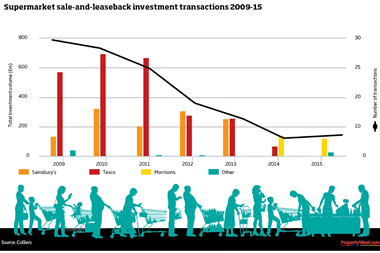The shake-up of the supermarket sector will have been lost on few, with three of the big four reporting eye-watering pre-tax losses (‘Losing their sparkle’, 03.07.15).
The diminution in share value will, if nothing else, drive a change of focus as no CEO will survive long if investments in these companies begin to suffer. The reported losses are largely attributable to the write-down in the value of property portfolios as the perceived value of out-of-town supermarkets continues to fall.
There is no one explanation for the falling market share of the big four, with reasons ranging from the growth of the discounters such as Lidl and Aldi, to changes in consumer shopping habits to online and convenience shopping. There is also the possibility there are simply too many supermarkets to deliver the sort of returns seen in the pre-crash era.
Mike Coupe, CEO of Sainsbury’s, recently dismissed the suggestion that we might be witnessing the death of the out-of-town superstore as “gross exaggeration”, but there is little doubt that we will see some radical reshaping of retail space over the next few years.
Consequently, a strategy that utilises or converts unused retail space or undeveloped sites for mixed residential/leisure/retail uses is likely to become increasingly attractive, as it would not only address the shifting demands of the consumer but also result in a much-needed increase in return on capital for some of our beleaguered large retailers.
The housing shortage should provide a welcome opportunity for these retailers to return to profitability.
The government has done much to reduce the red tape around planning. However, the sheer scale of the changes introduced over the last five years is such that few fully appreciate the options available to secure the change of use required. For example, a change to allow the ‘click and collect’ facilities at retail stores without the need for planning was introduced to address the change in consumer habits. Other options, such as neighbourhood planning and development consent orders may provide speedier solutions. There is always the option of extending permitted development rights further, to allow change of use to a specified mix of developments from a supermarket use.
If market forces are to drive the speed of change, a less restrictive regime would need to operate and a relaxation of the permitted development rights appears to be the magic pill.
Simon de Galleani, senior partner at Wedlake Bell and partner in the commercial property team; Jay Das, partner and head of the planning team at Wedlake Bell





























No comments yet